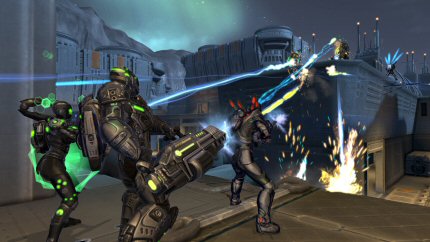Conquer persistent territory with player-formed groups called agencies.
Another thing in Global Agenda’s favour is its sheer depth. You can play PvE “dungeon” missions in groups of up to four or single-player, PvE defensive raid missions where up to 10 players defend a location against enemy attack, PvP 10v10 missions of various types, matched on the fly, or PvP 4v4/ 10v10 arena battles designed for pre-assembled teams, perhaps with the odd lone wolf to fill gaps. The character classes are perfectly balanced, and a lot of fun to play, with assault characters launching themselves via jetpack into the thick of the action, medics following carefully behind to keep them alive, robotics building sentry guns and barriers at crucial choke points, as recon units sneak into cover and snipe careless medics and robotics in the open. And then there’s the game’s pièce de résistance, Agency vs Agency combat.This combines turn-based strategy with FPS, as player-run Agencies form alliances to control various hexes on a map. Their leaders will plan out which hexes to attack and what areas to invest in – whether they be equipment, defensive shields, or missile silos, which surmises the turn-based aspect. They will then despatch a strike force of 8-10 troops with whatever equipment they deem necessary for the battle, who will engage in a PvP battle to secure the hex from the opposition, taking care at the same time not to risk the destruction of the expensive equipment that’s been entrusted to them.
It’s a combination that works extremely well, giving players a solid FPS experience that genuinely means something in a wider MMO world. One player’s death could mark the destruction of vital equipment, which could mean the loss of the match, which could mean the loss of a hex, which could mean the breakdown of a huge game-wide alliance, and in crucial missions, the tension really does filter through.

Continued overleaf...









